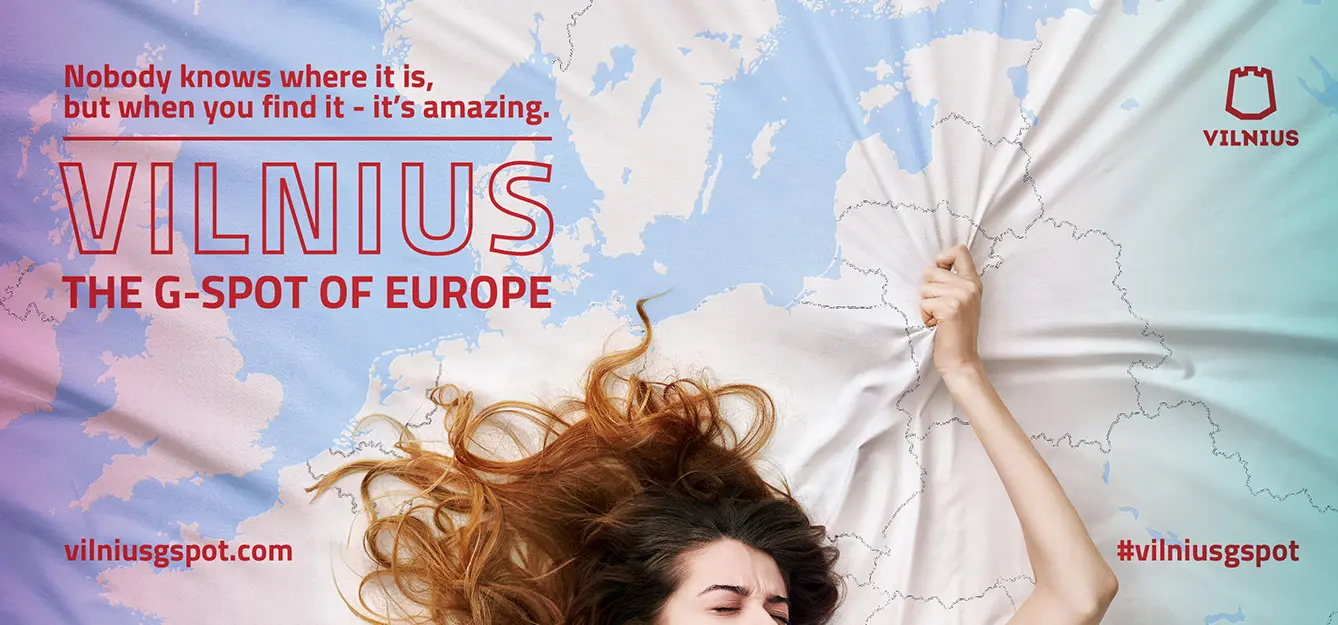What will neighbors say if you hit the G-spot and suddenly everything gets loud? That is precisely what the city of Vilnius asked in 2018 when it introduced a risqué-sounding marketing campaign with an unlikely slogan and matching graphic design. The slogan was: the G-spot of Europe.
Just look at their website: “Nobody knows where it is, but when you find it – it’s amazing.” You’re invited to “build your personal pleasure map,” but you also have the option to “skip the foreplay” and get right down to it.
Vilnius G-spot: don’t skip the foreplay
Our strong advice is: don’t forget about the foreplay. In a few sex-alluding (but ambiguous) questions, the website lets you build your own set of “pleasure spots,” which you can later swipe right or left, Tinder-style. Parks, sports facilities, bars, landmarks, and restaurants are all there, and every time you swipe right, it’s a match! Only later, the technique turns out to be a regular (well, not so regular) trip planner.
Was the sensation worth the sweat? Yes: “The X-rated marketing campaign increased tourism to this little visited country,” stated CNN, noting that the campaign launched only a few weeks before Pope Francis’s official visit to the city in August 2018.
But there was more to the campaign than simply that “sex sells.” The claim that started it all – the one comparing Vilnius to the G-spot, explaining that they were both hard to find but worth the effort – broke the spell. Known as a great value-for-money city break destination, it barely registered as a destination of choice for visitors. But that has changed.
The Church, moaning
Apparently, the first loud moaning came from the Church (Lithuanian society is mostly Catholic but not very observant compared to, say, neighboring Poland). The clergy was concerned about the sex-tourism associations of the campaign, with the additional expectation to at least postpone the campaign after the Pope had left. The municipality did not comply.
It seems this may have been a wise decision, as the increase in Western visitors was significant: 37 percent from Great Britain and 20 percent from Germany, two of the most important ad recipients. After the billboards were launched, Google searches for Vilnius rose threefold.
The ad campaign itself was appreciated as the best ad at the International Travel and Tourism Awards in 2019. Inga Romanovskiené, head of Go Vilnius, city tourism and promotion board, bragged about her city’s position in one line with giants such as Las Vegas.
The Las Vilnius Vegas
But, one has to admit, such company may be problematic. Las Vegas’s tourist offerings are broad, but its international image focuses rather on easy entertainment, à la “what happens in Vegas, stays in Vegas.” Critics claim that this is not the company Vilnius want to be in, with Western stag parties – city breaks with pub crawls as their main attractions, known to bring business but also harm to Central European cities.
But tourist officials are aware of the problem and declare to take steps to bring in only the culturally aware tourist traffic. And for them, it’s not all about sex: their latest campaign celebrating the upcoming 700th birthday of Vilnius is delightfully vintage, with a 1990s-style website where you can send (assumingly belated) e-cards to Vilnius for its big birthday with a captivating call for action: “Congratulate Vilnius the way you most probably will: late.” If you don’t want to be late, though, save the date: the celebration of Vilnius’ birthday will be held on 25-29 January, 2023.
We love their copywriting (on one photo, Lithuanian cold beetroot soup, chłodnik, is captioned “Foodies gonna food”) and Ektachrome/VHS-esque quality. With yet another such an original marketing campaign, finding the G-spot in Vilnius has our verbal consent. And how about you?







